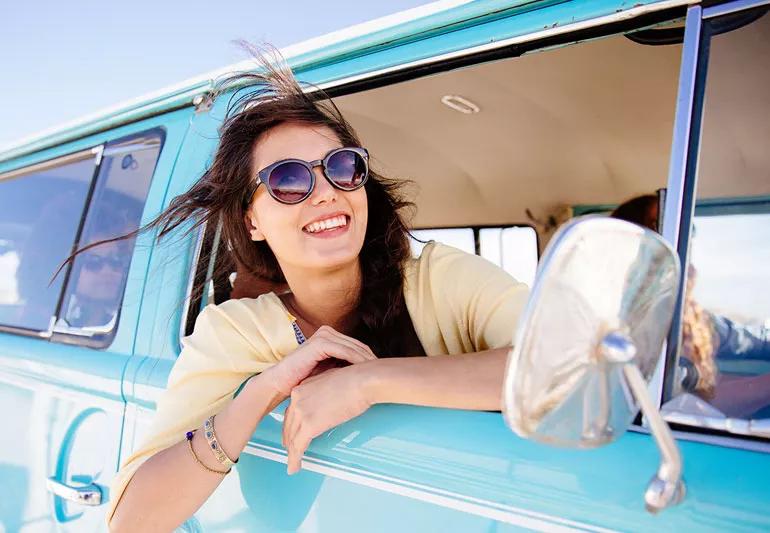Polarized lenses have an added benefit of a special coating that reduces glare on reflective surfaces like water and snow

When the weather is glorious and all you want to do is soak up the sun, you still need to take protective measures for your eyes by wearing sunglasses.
Advertisement
Cleveland Clinic is a non-profit academic medical center. Advertising on our site helps support our mission. We do not endorse non-Cleveland Clinic products or services. Policy
But with countless styles and prices to choose from, how do you know which is the best choice — and offers the best protection? When it comes to polarized vs. non-polarized sunglasses, which ones should you get?
Optometrist Chris Erwin, OD, offers advice when picking out your next pair of sunnies.
Polarized lenses have a special coating that reduces glare, especially on reflective areas like water, asphalt or snow. This is especially helpful when you’re driving. And if you’ve had refractive eye surgery like LASIK, polarized lenses are a great choice.
“Polarized lenses do a fantastic job of removing glare while driving and boating, making the world look crisper and clearer than sunglasses alone,” says Dr. Erwin.
Are polarized sunglasses better?
“Polarized glasses reduce glare from horizontal surfaces such as water, the road and snow,” affirms Dr. Erwin.
Though usually more expensive, these lenses are an optimal choice for those who drive often or spend a lot of time by the water.
If you choose to go with non-polarized sunglasses, you won’t have that anti-glare protection. But overall, Dr. Erwin says you should make sure your sunglasses have UV-protective lenses.
“Larger glasses are generally better, as they offer more protection from UV rays from odd angles, such as above or from the side,” he says.
Advertisement
And when it comes to other options such as mirrored vs. regular lenses, it’s purely a style choice.
“There is no difference in sun protection between different styles of lenses as long as they are all UV protective,” Dr. Erwin says. “Appropriate lenses will generally say UVA/UVB or UV400.”
You may also have to consider the color of your lenses. For example, choosing sunglasses with gray lenses will also provide the least color distortion, while yellow lenses improve contrast (but don’t usually help with the sun).
Why should you choose polarized sunglasses? Polarized sunglasses can:
“Polarized sunglasses are great for anything from an easy hike to a day of boating,” says Dr. Erwin. “Your eyes will be more comfortable, and the colors will pop.”
While there are plenty of benefits when it comes to polarized sunglasses, there may be certain occasions where non-polarized options may be best:
So, are polarized sunglasses worth it?
It all depends on how you’ll wear your sunglasses. If you’re outside a lot, it may be the better choice, as polarized lenses offer more benefits than non-polarized. But it’s all about personal preference.
And whether you choose polarized or non-polarized sunglasses, remember that you want to make sure your option has UV protection — UV rays can affect your eyes both in the short and long term.
“It’s possible to develop keratitis, which is like sunburn on the eye,” Dr. Erwin cautions. “Long-term exposure to UV rays can increase the risk for cataracts, macular degeneration or cancers around the eye.”
When shopping for sunglasses, he advises taking the time to ensure you’re purchasing a pair that is stylish, comfortable and offers the best protection from the sun for you and your needs.
Advertisement
Learn more about our editorial process.
Advertisement

A correct prescription helps your eyes see clearly — but as natural changes occur, you may need stronger or different eyeglasses

It usually takes anywhere from a couple of days to a few weeks to get fully adjusted

The lifespan of contact lenses depends on whether you have reusable or disposable lenses

While rare, it is possible to have an allergic reaction to materials used in contact lenses or ingredients found in contact solution

Keep your eyes healthy by not sleeping in your contacts, properly caring for your lenses and wearing eye protection when necessary

While it may seem harmless, showering — or even swimming or washing your face — with contacts in can cause sensitivity to light, irritation and even an infection

Even napping with contacts in can lead to eye infections, lens displacement and dry eyes

Both have pros and cons, but ultimately it’s a personal decision only you can make

The tropical fruit is a good source of antioxidants and vitamin C

Most people fall asleep within 10 to 20 minutes, but if your experience is different, adjusting your sleep schedule may help

Exploring your hidden side can lead to better understanding of what makes you tick